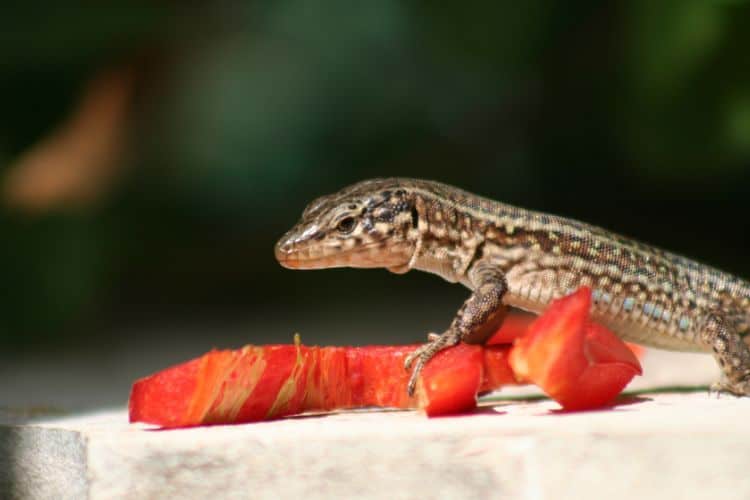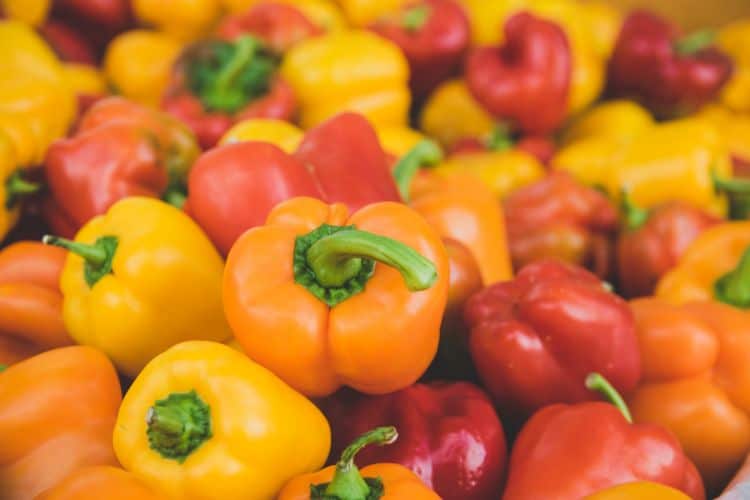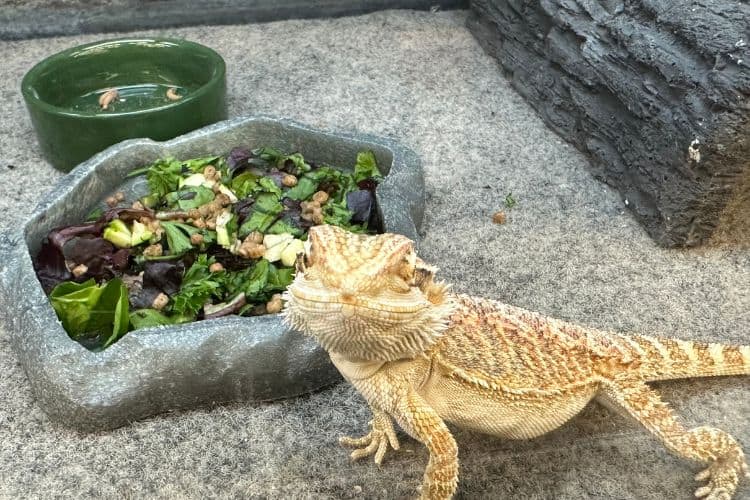Ever wondered if a bearded dragon can have peppers as a treat?
Yes, your bearded dragon can eat peppers – in moderation, as part of a varied diet. However, peppers should be fed in limited quantities, as they can potentially cause digestive upset if overfed.
In this article, we’ll explore the benefits and potential risks of feeding peppers to bearded dragons, look at how to prepare peppers for your dragon’s diet, and discuss how much and what types of peppers to feed.
Read on to learn more about feeding peppers to your scaly friend!
How to Feed Bearded Dragons Peppers?
When adding peppers to your bearded dragon’s diet, there are some important factors to consider regarding portion size, frequency, preparation, and what foods to combine them with.

Portion Size
Bell peppers contain compounds that can bind to
For an adult dragon, provide around 1-2 slices or strips of pepper 2-3 times per week. Pieces should be no larger than the space between your dragon’s eyes. As for juvenile dragons, give them peppers no more than one or two times in a month.
Remember: Overfeeding peppers can lead to nutritional imbalances.
Frequency
Feed peppers sparingly. Their high phosphorus content can cause issues if fed too frequently. As such, space out pepper feedings with a few days in between each serving.
How to Prepare
Wash peppers thoroughly and remove stems, seeds, and membranes before cutting into small slices or strips. You can serve them raw, cooked, or lightly steamed. Just ensure pieces are bite-sized for easy eating.
What to Combine With
Serve peppers alongside foods rich in calcium, like kale, turnip greens, and butternut squash. The
Fruits, such as blueberries and raspberries, also make great compliments to balance the nutrition.
How Are Peppers Good for Your Bearded Dragon?

Bell peppers provide great nutritional value for bearded dragons! They contain antioxidants that prevent inflammation, boost the immune system, and aid digestion.
Peppers are also excellent sources of vitamins A, C, E, K, and B6, all of which support vision, reproduction, growth, blood health, and tissue repair.
The vitamin C in peppers helps strengthen bones while vitamin A promotes healthy skin and scales. Plus, peppers provide potassium for heart health and folate for cell and tissue maintenance.
Additionally, peppers have a high water content, especially red peppers, so they can help hydrate your dragon. That said, feed them in moderation, as too much can cause diarrhea.
Are Peppers Bad for Your Bearded Dragon?
While nutritious in moderation, peppers do come with some drawbacks to be aware of.
First, peppers lack sufficient
This
Additionally, the high vitamin A content in certain peppers could cause toxicity if your beardie is already getting vitamin A from supplements.
Symptoms of vitamin A toxicity include swelling, lethargy, and weight loss. Red bell peppers, in particular, are rather high in vitamin A.
What Veggies Are Best for Your Bearded Dragon?

Fun fact: Vegetables should make up 25% of a baby dragon’s diet, increasing to 50% for adults.
When selecting vegetables for your bearded dragon, it’s important to offer a varied mix to provide comprehensive nutrition. Here are some top options to include:
Calcium-Rich Vegetables
Collard greens (i.e. broccoli and cauliflower), kale, bok choy, and mustard greens are excellent
They also provide vitamins A, C, K and folate. Make sure to chop greens into bite-sized pieces and mix with other veggies before giving them to your pet.
Vitamin-Packed Vegetables
Bell peppers, carrots, squash and sweet potatoes are full of beneficial vitamins and antioxidants. For example, bell peppers contain immunity-boosting vitamin C. And for easy digestion, bake squash and sweet potatoes beforehand.
Leafy Greens
Leafy greens like romaine, red leaf lettuce, endive, and escarole offer great texture and hydration. Remember to rotate different greens to add diversity. Avoid iceberg lettuce though, as it lacks nutrients.
What Veggies Should You Avoid Giving Your Bearded Dragon?
Certain vegetables should be avoided or limited in a bearded dragon’s diet. Spinach, broccoli, and romaine lettuce contain oxalates that can bind to
Entirely avoid potentially toxic veggies like onions, chives, garlic, rhubarb, avocados, mushrooms, and eggplant. These can directly harm your dragon’s health.
In Summary: Should Your Bearded Dragon Eat Peppers?
In conclusion, bell peppers can be a nutritious occasional treat for bearded dragons when fed properly. Their vitamin and antioxidant content provides benefits, but overfeeding can cause issues.
As such, limit portions to 1-2 small slices 2-3 times per week at most. Always serve peppers with
Fed in moderation alongside other vegetables, fruits, and proteins, peppers can give your bearded dragon’s diet a healthy boost!

